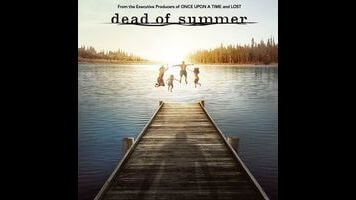Frothy is not the same thing as vapid. Entertainment can be stimulating without also being challenging, and one of the biggest hurdles faced by the makers of soapy summertime TV—the small-screen equivalent of a dishy beach read—is to keep things surface-level light without sacrificing the necessary amount of depth that keeps an audience engaged. Dead Of Summer, Freeform’s new supernatural summer-camp horror series, is reasonably entertaining, but likely not for the intended reasons. Its story is so clunky, and characters so wafer-thin, it all but evaporates into a haze of trite jump-scare beats and hoary teen tropes.
It’s hard to believe almost everyone onscreen is hiding a mysterious secret, given their collective inability to exhibit more than one character trait per person. This crew of camp counselors give the disposable youths of Friday The 13th films a run for their unfunny. (The third episode is even titled “Disposable,” an all-too-apt tag for everybody involved.) It’s the kind of show where a dangerous-looking guy says, “Don’t judge a book by its cover,” and then 30 seconds later demonstrates that his cover is, in fact, absolutely correct, and he should be judged by it. Instead of making a show that’s breezy and simplistic fun, the creators of Dead Of Summer made their characters insipid and flat, one-note throwaways in service of a messy mystical campfire tale. The reductive nincompoops of Scream Queens qualify for Mensa membership in comparison.
What makes it watchable is the camp factor, a hearty dose of over-the-top ridiculousness embodied in the always-welcome presence of the show’s ghostly specter, played by Tony Todd. He kicks things off as the oddball who was killed more than a century ago on the lakefront shores that became Camp Stillwater, the base of operations for all these murderous goings-on. Set at the tail end of the ’80s (with an era-appropriate soundtrack to boot), an unknown tragedy several years earlier forced the camp’s closure. Now, a new director (Elizabeth Mitchell, sensibly underplaying all this hokum) is re-opening the place for business, with an assemblage of former campers and close friends, joined by a couple of shy newcomers (Zelda Williams and Elizabeth Lail). Each counselor is a gloss on a stock type quickly refuted by a portentous history, and even the more capable actors (Amber Coney shines as an insecure wannabe sexpot) are frequently defeated by the clumsy dialogue. Within 20 minutes, someone’s dead, but because the show must go on, this camp doesn’t even pause for a funeral. People are having unearthly visions, campers are uttering eerie death threats, and a bevy of mystical backstories lurch into motion.
It’s no surprise to learn producers from Lost are behind Dead Of Summer, as it borrows that show’s tactic of weaving a different character’s troubled backstory into each episode. But whereas that series left some mystery to its individuals, every flashback here has a one-to-one correlation with the present, a blanket explanation for their behaviors, no matter how trite. There’s a silly delight to be had in playing “guess the upcoming plotline”—the series has so many Chekhov’s guns it pulls off the mantle between seemingly each commercial break, it could easily rob the entire cast of a more well-rounded show. There’s a creepy secret cabin, an evil map, a young camper who can communicate with Todd’s ethereal weirdo, and a host of mystical mumbo-jumbo ready to be put into play at any given moment. You can either roll your eyes at the clichéd and dim-witted shout-outs—a menacing, pentagram-wearing drug dealer from the nearby town is named “Damon Crowley”—or you can take some pleasure in the hammy theatricality of it all.
Despite the lack of any compelling characters to speak of, there’s an Agatha Christie-like fascination in seeing who the show is going to off, and in what order. Without even sillier plot twists up ahead (a distinct possibility), most of these counselors are too superficial and see-through to be capable of participating in a supernatural conspiracy, meaning any of them can go at any moment. (The end of the third episode has a particularly funny and out-of-nowhere mortal peril that’s almost a literal deus ex machina.) Most of them are far too self-absorbed to engage in the larger world. With rare exceptions, everything is about doing whatever you have to in the name of hooking up with your chosen guy or girl, even (or especially) if it involves throwing another person under the bus. It’s got an element of All About Eve salaciousness to it, but not enough brains to make you eager for more.
Dead Of Summer is a mess, but it’s the kind of mess that allows for a degree of back-handed enjoyment at the absurdity of it all. The avowed lack of subtext and commitment to delivering every characterization and plot twist (or red herring) in the most straightforward manner possible makes for a a suitably binge-able series, but it’s so airy and weightless that you might forget all that’s come before during the wait between episodes. It’s the trashy paperback you discover in the bedside drawer of a beach rental: It passes the time, but there’s not much to recommend it beyond the fleeting indulgence of a goofy trifle. This death does ride a pale horse, but that’s because too much of the color’s been drained.









![HBO teases new Euphoria, Larry David, and much more in 2026 sizzle reel [Updated]](https://img.pastemagazine.com/wp-content/avuploads/2025/12/12100344/MixCollage-12-Dec-2025-09-56-AM-9137.jpg)































